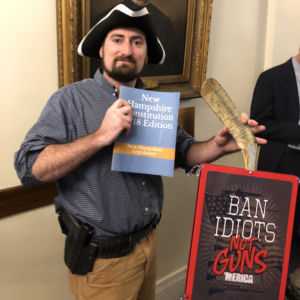EDITOR’S NOTE: For another view, please see Point: Second Amendment Sanctuaries Reflect the Will of People Who Value the Constitution
There is no such thing as a “Second Amendment sanctuary.” This concept is a legal fiction adopted by a small minority of local leaders to undermine normal democratic processes and override the will of a majority of a state’s voters.
Any resolution enacted by a local governing body that attempts to pick and choose which state laws apply in a particular jurisdiction is at best a symbolic gesture akin to a protest sign. At worst, these resolutions undermine duly enacted state laws and jeopardize public safety.
Although declarations by local legislative bodies that certain gun laws do not apply have no legal effect, they still have the potential to jeopardize community safety. The kinds of gun laws targeted by these resolutions — laws like universal background checks, safe storage requirements, and extreme risk protection orders — are designed to prevent shootings by addressing different aspects of the gun violence problem.
So-called “Second Amendment sanctuary” resolutions undermine these crucial laws by tacitly (or in some cases explicitly) encouraging residents to violate them. This impedes the implementation of these laws and prevents them from having their full protective effect.
For example, state laws requiring universal background checks for all gun sales are designed to prevent people who are prohibited from gun possession from having an easy channel to buy guns. If a county resolution explicitly states or implicitly suggests that a universal background check law does not apply in a particular county, residents may rely on that resolution to sell guns without a background check in violation of that law. This would mean that individuals prohibited from gun possession because of a prior conviction for domestic violence would be able to buy guns in that locality, potentially putting the community at risk for future violence.
This is not a hypothetical risk: research by Everytown for Gun Safety found that in more than half of mass shootings between 2009 and 2018, the perpetrator shot an intimate partner as part of the attack.
Another example: state laws that require gun owners to store guns securely are designed to prevent unauthorized access to firearms. County resolutions that undermine this type of law could lead gun owners to leave their guns unsecured, where they would be vulnerable to theft. Again, this is a real concern. A Center for American Progress analysis found that an estimated 1.2 million guns were stolen from 2012 to 2015, many of which were later used in violent crimes. Unsecured guns in the home can also lead to tragic unintentional shootings by children.
Stunningly, an Everytown analysis found that there have been at least 193 unintentional shootings by children so far in 2019.
These resolutions also do a tremendous disservice to the individuals who are calling for their enactment. Residents who rely on a “Second Amendment sanctuary” resolution to violate state law put themselves in jeopardy of criminal prosecution by state law enforcement agencies that will continue to enforce these laws statewide despite any local objection.
Individuals who object to the enactment of new gun laws are not without recourse. Our democracy has a system in place for those who believe that a law is unconstitutional: litigation. According to the Giffords Law Center, there have been more than a thousand Second Amendment challenges to gun laws in just the 11 years since the Supreme Court’s decision in District of Columbia v. Heller. (It is worth noting that the majority of these challenges have failed and most courts have found that state laws regulating guns are do not violate the Constitution.)
There is also a democratic process in place for individuals who disagree with the actions of their elected officials: elections. Individuals dissatisfied with legislation that has been enacted are encouraged to vote for different legislative and gubernatorial candidates in the next election. If the view of those pursuing these resolutions truly represents the view of a majority of voters in the state, they should organize their peers to help ensure that different candidates are elected to those offices who will repeal those laws.
The word “sanctuary” is defined as “a place of refuge and safety.” That is exactly what strong gun laws are intended to do: create communities safe from gun violence. With 100 people dying by gunfire every day, nothing could be more important. And despite their name, resolutions intended to undermine these laws will have the opposite effect, leaving those communities less safe.

